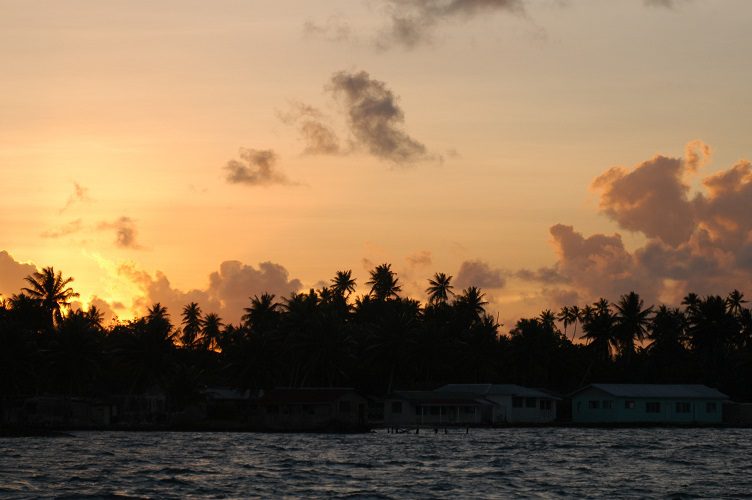Penrhyn, Northern Cooks
Penrhyn, Northern Cooks
S 09o 00’
W 157o 53’
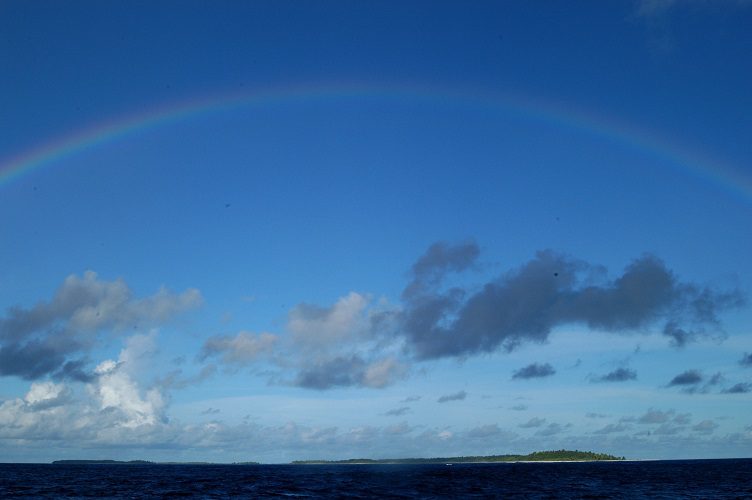
We arrived in Penrhyn atoll the afternoon of Wednesday, July 14th. Penrhyn is the northern most of the Cook Islands, 1800 miles away from the capital island of Rarotonga. The Cooks are a “self-governing demoncratic commonwealth affiliated with New Zealand” (Ref. Charlies Charts). Similar to many of the islands in the South Pacific, Penrhyn is a ring of coral left behind by a volcanic island that has long since sunk below the surface. As we cautiously entered the lagoon through the western pass, the town of Omoka could be seen to the South. It glistened picturesquely with its clusters of tin roof buildings lining the shore and nestled in the palms. After the pass, we followed a channel through a series of white and red pennants mounted on top of the coral heads, obviously intended to guide boats to the water off the town dock. Once anchored, we took a closer look at the town. Except for a few children fishing on the wharf and the occasional motor scooter, it appeared deserted. Many of the houses you could look straight through from front to back, as if there were no curtains, furnishings, or occupants. Omoka, the main village on Penrhyn atoll resembled a ghost town.
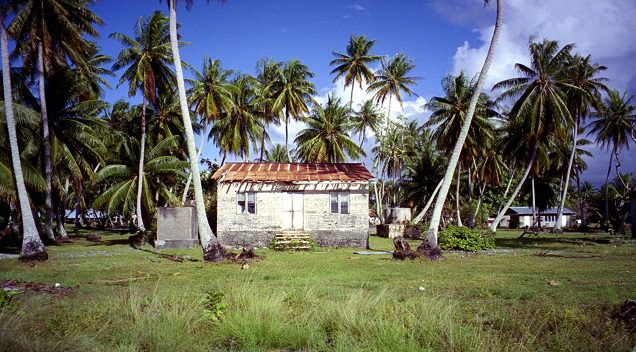
Although we were both tired from the passage, Peter and I lowered the dinghy into the water and started to row in. Before we could land, however, we were waved off by a man who had appeared on the edge of the quay. He shouted that they would come to us. We rowed back to the boat, and within half an hour, he, and two other men, approached in a large aluminum power boat. One was from immigration, the second from customs, and the third, who had waved us off, was the harbor master. They carried clip boards and forms under their arms. They had the usual forms to fill out, but seemed to want something else. Finally, the custom’s officer asked if they could have something to drink. Peter served them juice from our limited supply of beverages. As they drank, they began to inquire about our video equipment. It felt odd to be speaking English again. After some confusion, it became clear that the customs officer wanted to know if we had any DVD’s they could borrow. Our subsequent contribution to the culture of the Cook’s islands was to loan them a copy of “Happy Gilmore” that my son Matthew had left on board. Apparently very happy with the loan, they thanked us for the juice and left after serving us with a bill of $140 for the anchorage, exit fee and their official time. Not as expensive as the Bahamas, but a little excessive for a two day stay.
The next day we rowed in again, this time making it to shore, and began our walk-about of the town. As they had seemed from the water, many of the houses were abandoned. Some were mere cinder block shells or foundations, most likely left over from World War II, when the US had built an airstrip and stationed troops on Penrhyn. Sixty years later, the population of the island is reported to be from 200 to 600, depending on whom you ask.
During the brief day and a half that we spent on the island, we sensed social dynamics and met an intriguing cast of characters that would provide the stuff of plays. With that inspiration in mind, the following are some semi-accurate “scenes sketches” from a day in the life of Penrhyn Island, as seen through the eyes of a “Yachtie.” It is offered with apologies to any and all playwrights, and especially to the people of Penrhyn for the presumptuousness of characterizing them after only a day in their midst. But, even after a day, one can appreciate that the inhabitants of Penrhyn struggle to make a living on an island that is isolated from the rest of the world by miles and miles of ocean. They can’t just get on a boat and sail away.
The Emperor Penrhyn (first and last draft):
Scene 1 : The arrival,
On board the Lillian B.
Scene 1: Cast of Characters (in order of appearance):
Two yachties
Ru, The harbor Master
Customs Officer
Immigration Officer
Tata: The Health Officer (appears at the end of scene 1)
(most of scene one was already discussed above)
Scene 2: To the airport (On the island)
Scene 2 Cast of Characters (in order of appearance):
Ladies in Bank
Rosaline
World War II Vet
Work crew
Mad Hatter (Warwick)
The two yachties, both with unkempt hair and wrinkled clothing, row into shore and begin walking north through the village, along a road of crushed coral. Small shanties and the remains of cinder block houses line the road. Most are empty, others occupied as if by squatters. An occasional motor scooter drives by. Along the way is a building with a wooden sign identifying it as “Bank”. The two stop and ask the ladies sitting behind the counter if they can exchange money. One lady reacts as if the question were inappropriate. Sensing her embarrassment, Yachtie #1 offers the airport has an alternative, as had been suggested by the Harbor Master in scene 1.
Lady at the Bank replies as if relieved, “Yes, you should change money at the airport.”
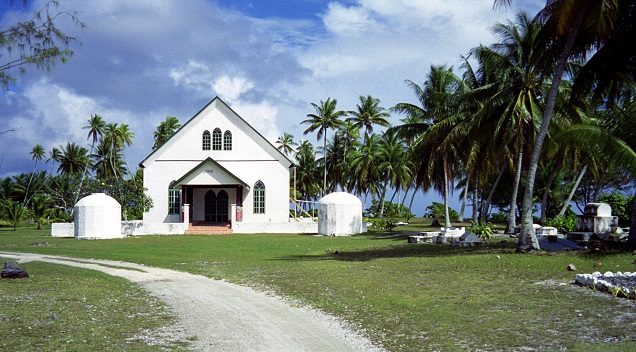
The pair continues along the road which curves to the west to reveal a picturesque white stucco protestant church surrounded by palm trees and backed by the Pacific Ocean. There are graves to either side of the road. The church is bright and well maintained, the graves are crumbling. Some of the inscriptions are in the local language, others in English. One reads, Harold Viggo Rasmussen, Born Denmark 1869. Died Penrhyn.
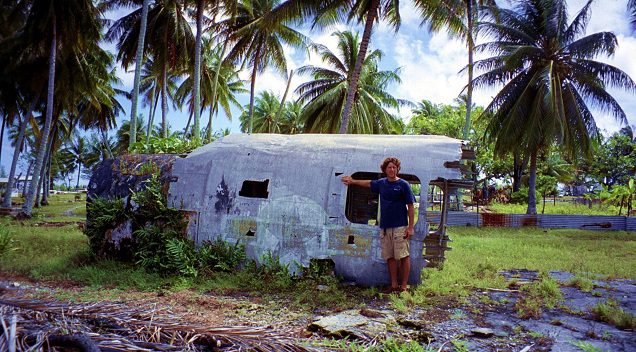
Off to one side of the graves are the remains of a World War II Liberty bomber. The fragments include cylinder heads from one of the engines and part of the fuselage with its thin aluminum skin stretched over a fragile frame. On the side of the fuselage is a faded US Stars and Stripes Emblem.
Off to the other side is a pig pen.
The yachties continue past the church as the road loops back around, heading out of town and towards the airport. Pigs and cats roam about. There is not a single dog. As the pair walk, they stop to talk to a pretty young woman, named Rosaline. She is from a family of 5 sons and 5 daughters; her mother is the village breadmaker, Christine, of “Charlie’s Charts” fame. Her father is a minister and pearl farmer. Rosaline has just returned from the capital island where she has been studying the science of growing black pearls in the hopes of reviving her fathers business. Pearl farming was once a thriving business for the island, but blight in 2002 devastated the industry.
Further down the road, the grandfather of Roseline beckons the two yachties into his home. Inside, the walls are covered with old photographs. Born in 1928, he was a teenager when the United States built and manned the airfield. Early in the war, the Liberty Bomber, now lying in the church graveyard, was in trouble and trying to land on the Penrhyn airstrip at night. He and others from the town illuminated the runway with torches to enable the pilot crash land the bomber. The pilot and crew survived.
With only a little encouragement, he continues to recount the war, ending with the memory of a friend, a US major, who boarded a ship leaving Penrhyn to go fight the Japanese. He left with a promise to write that was never to be fulfilled.
Continuing out the road to the airport, the two are again beckoned to visit. A work crew of five sit under a wooden roof attached to a cinder block house. The attached structure serves as a storage shed for an array of rusty tools. A small bulldozer sits in the driveway. The men, Polynesian in appearance, are sitting around a wooden table, taking a mid-day break from cleaning up the airfield runway. They offer instant coffee with milk, and then fall silent. In an effort to generate conversation, the yachties talk about their impression of the island and mention the graveyard and the name Rasmussen on the tombstone.
The swarthy Worker #1 who looks generations removed from being Danish says with pride: “I am Rasumssen.”
He is also related to Rosaline. Apparently, everyone on the island is related in one way or the other.
Having finished the coffee and exhausted their topics of conversation, the yachties thank the workers and head out the remaining two kilometers to the airfield. The airfield is an asphalt strip that stretches out of sight amid the palms. Grass grows up through the pavement. There is no terminal. Off to the side are stacked fuel drums and a large shipping container like what one would find on a container ship. Next to this is a small Quonset hut and a shack with weather equipment on the top. The shack door is partially hidden behind by a curtain of colored streamers.
Yachtie #1: Knocks tentatively on the door.
Mad Hatter (Warwick): Shouts “Who the F— is it now?”
Yachtie 1: Ah .. sorry, if this is bad time we can come back later.
Mad Hatter (Warwick): (Opens door and glares. He has long unruly hair and a woodsman’s beard): Yes, Please do!(Shuts door).
Yachtie 1: “So what do we do now?”
Yachtie 2: “Come back later, I guess.”
Scene 3: The hospital
Scene 3 Cast of Characters (in order of appearance):
Tata (Health inspector and husband of the island nurse, uncle of Rosaline)
With time to kill, the two return to the hospital to visit the health inspector, Tata, and explain to him that they have been unable to change currency with which to pay the health inspection fee.
The hospital is a new facility with a layout similar to a motel. There is a row of four examination rooms on one wing, a set of living quarters on the other, and a reception area in the center. Plate glass windows look out on the lagoon on one side and the ocean on the other. Numerous signs stressing the dangers of smoking, obesity, and illegal drug use are posted on the walls. Behind the reception counter is a pharmacy with a modest inventory of drugs. The hospital is staffed by Tata’s wife, a nurse. There is no doctor.
Tata, a handsome, personable Polynesian in his early thirties, comes out to greet them. He invites them to come into his living room and offers cold juice and cookies:
Tata: “Warwick. He is always like that. A lot of people don’t like him. He takes weather observations between noon and three o’clock. Better go back after that. Besides, it’s election time on the island. Everyone is a little crazy at election time.”
Tata then provides an introductory description of the local politics. The current representative, “the emperor,” of Penrhyn has been convicted of improper use of funds, but remains in power. Tata points to a dock below the hospital, on the lagoon side of the atoll. Built of solid timbers, it extends 80 yards across the shallow coral, but stops 30 yards short of deep, navigatable water. Immediately next to it, in parallel, is a 35 yard stone pier. The wooden dock was supposed to be built as an extension of the stone pier, thus reaching into deep water to serve ocean going vessels. Instead, it is no more than a fishing peer, decaying for lack of maintenance funds and usefulness.
Yachtie:” Didn’t the engineer figure it was in the wrong place when they started building?
Tata:” Yes, but the “Emperor” ordered the work to continue anyway.”
Yachtie: “So how does he get reelected?
Tata: “He has friends in New Zealand. And more than half the people on the island either owe him money or depend on him for their jobs. It is a very bad situation. The island is currently very divided. And, the elections are not until September.”
He continues to discuss the problems of life on an isolated island, including the relatively high tariffs charged yachts. On the internet, Penrhyn has a bad reputation among yachties. He would like see the government lower the fees to encourage much needed tourism. In that regard, Penrhyn is a stark contrast with the successful tourist destination, Rangiroa, an atoll of similar natural beauty. After discussing Penrhyn politics, the discussion turns to the status of pearl farming on the island. Tata points to the pearl hatchery next door to the hospital. “They are glad to have visitors.”
Scene 4 Pearl Hatchery
(A series of buildings and tanks spread out over an acre lot)
Scene 4 Cast of Characters (in order of appearance):
Maria: A stocky New Zealand woman in her early thirties.
Yachties enter the doorway of the main building. Maria immediately jumps up from her chair behind a desk and exclaims. “Yachties! You know, we don’t get many visitors around here. Let me show you around!”
Marie then gives them a tour of the oyster hatchery, which rivals the complexity of the Jack Daniels distillery. Various tanks circulate precise mixtures of sea water and nutrients at controlled temperatures to enable the growth of juvenile oysters to be sold to the remaining farmers trying to revive the islands pearl industry.
Maria:” Unfortunately, they don’t do very well. The standard line seems to be: ‘I’ll be back for next batch when these die.’”
Back in the office, the topic includes island politics and the tension between different factions.
Maria: “Yes, I’ve been told I’d loose my job if I didn’t vote for the current representative. But I don’t care. They can take my job if they want. I’ll just move back to New Zealand. Screw ‘em.
“So where are you headed next?”
Yachtie: “Right now? Out to Warwick, to change money.”
Maria: “ Ah … good luck. Not a bad fellow once you get past the obscenities. Quite friendly really. The other day he stood in the doorway and talked for an hour. Just don’t interrupt him when he’s flying his weather balloon.”
Yachtie: “Thanks for advice … and the tour.”
Maria: “Anytime!”
The Airport, Take two.
Yachties walk out to the airport. On the way, they pass the “Emperor’s house.” Modest by US standards, it is a well maintained single house with a large manicured front yard, surrounded by a two foot high chain link fence with barbwire on top, most likely to keep the pigs out. Continuing to the airport they arrive outside Warwick’s hut, where he stands watching their approach. He looks straight at them and preempts any introduction with:
“There is no f—— way I’m going to exchange money for you guys. I keep telling them, I’m not a f—— bank. Some guy came in the other week with consecutively numbered five dollar bills. He could be from a drug cartel for all I know. I have over $5000 dollars in US cash. When am I going to get the chance to get to New Zealand?
Yachtie: Ignoring the temptation to express doubt that a drug dealer would bother to come all the way to Penrhyn to launder money, responds: “ Sorry … the customs officer told us to come to you …”
Warwick: “ I sell goods. I do not change money. If you buy something from me, I will accept US currency. I am not a goddamn bank. How f—— difficult is that to understand?
Yachtie: “ Sorry … all I know is that we were told that you exchange money and that you give a fair exchange rate. But ..ah .. in anycase … we definitely want to buy some beer.”
Warwick. “Well, … I can’t even tell you what the exchange rate is. My computer is down so I don’t have access to the internet. And the f——- dollar is getting weaker every day. But, … you’re in luck on the beer. We had a delivery recently. We have VB which is a 5% alcohol, slightly bitter, and a maltier Speights, slightly smaller cans, less alcohol. But don’t ask for milk. I ordered 10 pallets and instead get only a goddamn case. F—— idiots.
Yachtie: “Beer’s good. How about a case of each?”
Warwick: “Fine, come with me.”
Warwick then leads them to a large transport container. Unlatching and opening the door reveals case upon case of various beers. As Warwick sorts though the inventory, he comments on the quality of each variety he encounters.
Yachtie: “I guess we’ll stick with the VB and Speight’s, thanks.”
Back in front of his hut, Warwick pulls out his calculator.
“Okay, how much money would you need to exchange?”
The yachties quickly itemize their entry fees and add an extra twenty in spending money. “How does $170 sound?
Warwick: “I’ll have to give you the exchange rate from earlier this week.”
Yachtie: “No problem, that would be great, thanks.”
Warwick: “Okay. There it is. But this is the last time I exchange money for anybody. You can tell then that. … How long are you staying and where are you going from here?”
Yachtie: “ We’re heading up to Christmas Island and then Hawaii. … You don’t happen to have a weather report do you?
Warwick: No, I’m a weatherman but I can’t even tell you what the f—— weather is. My damn fax is down. The supply plane now only comes in once every two weeks and it didn’t bring the right parts. Used to be once a week. We don’t have enough fuel. I can only radio my observations to New Zealand.
After another ten minutes of discussion on the state of the art in communications and weather, the two yachties host the beer on their shoulders and begin the trek back. As they pass the hospital, Tata and his nephew come out and insist on giving them a ride to the boat on the back of their scooters.
Scene 5: Departure (On shore)
Next day. The yachties, having decided to leave while the weather was good, row in and begin the check-out procedure. This amounts to a half day process of finding the right officials to stamp various exit papers and retrieve Happy Gilmore. On the way back to the dinghy they meet Tata greeting attendees outside a small building.
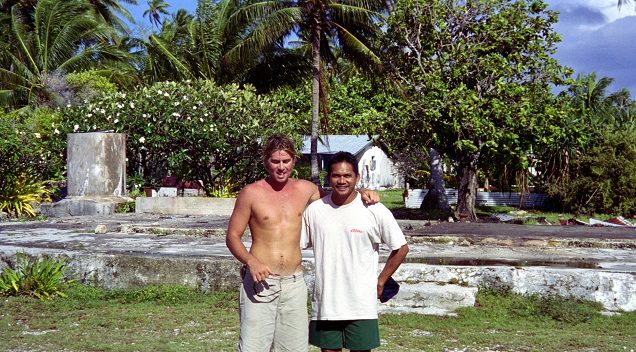
Yachtie: Hey Tata. Glad we ran into you ..we’re heading out today. It was good to met you.
Tata: Not staying longer? Well, it was very good to meet you. Have a safe trip.
Yachtie: Yeah, thanks. …. Meeting?
Tata: “ Yes, we are having a political meeting. Maybe we can change things.”
Yachties. “ Well, for what it’s worth, you’d get our votes.”
The three shake hands. Tata continues to greet arriving attendees as the Yachties return to their dinghy, row out to their boat and get ready to leave Penrhyn behind.
